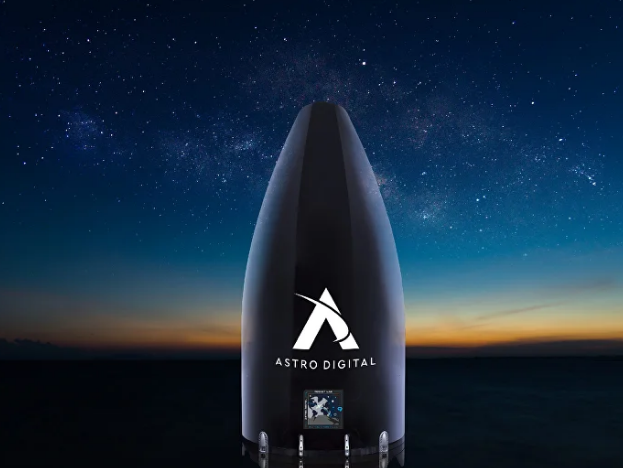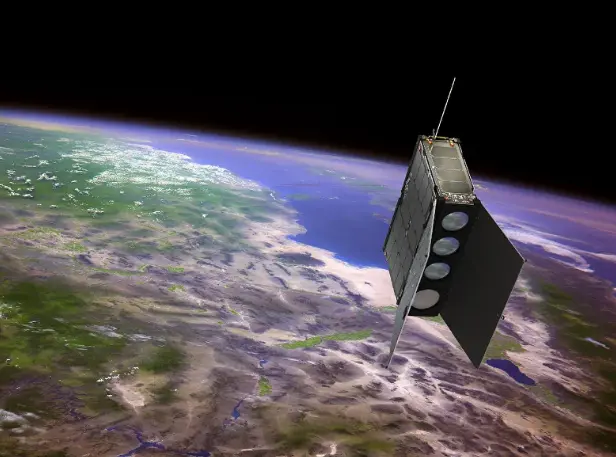Location/Region: Santa Clara, CA
Industry: Aerospace
Apps implemented: Sales, Time Off, Accounting, Manufacturing, Inventory, Projects, Time, Tracking, Expenses, Documents, Sign, To-do, Discuss, Website, Employee
Number of users: 70
Company size: 72
Hosting type (On-premise or Odoo online): Odoo.sh
On a clear evening, the night sky is freckled with thousands of small, radiant specks of light. Many of these lights are stars within our galaxy, but some of these objects are, in fact, satellites orbiting Earth. Satellites serve many everyday functions, from sending TV signals to our homes, to transmitting cell phone calls across the globe, to giving us GPS that helps us navigate. The technology that satellites provide has increasingly become integral to life in the modern world– making the aerospace industry one of the fastest-growing industries today.
Astro Digital, based in Santa Clara, California, is one of these aerospace companies making their name known in the industry. Since 2015, Astro Digital has been designing, building, and operating satellites for its customers. CEO and co-founder Chris Biddy first stepped foot into the aerospace industry when he worked in a small satellite lab during college. With the proliferation of the small satellite movement over the last 15 years, he recognized the value of starting his own company within the field and founded Astro Digital.
Today, Astro Digital’s clients utilize the company’s services to send satellites up to space in order to make an impact down on Earth. Their satellites perform tasks such as monitoring pollution from methane, reporting weather patterns, and servicing other satellites that are up in orbit.
In the high-tech aerospace industry, precision and efficiency are critical for any business. While at one point, Astro Digital utilized a system comprised of different applications to manage its business operations, its growth demanded more integrated software. Enter Odoo.

Lost in space without Odoo’s structure and connectivity
Designing, building, and operating satellites is no small task, as Astro Digital knows. Michael Wilson, EVP of Operations and CFO at Astro Digital, explains the company's typical, complex process for each customer and satellite. After new clients reach out to Astro Digital for their needs, the company looks at the customer’s requirements and proposes the satellite that fits the clients’ needs best. This may be a smaller or bigger-sized satellite, which in turn determines what orbit the satellite will go into. Once a satellite is chosen, the team starts the design process, building a bill of materials (BOM) for the product. Astro Digital works with large providers such as SpaceX to launch the satellites once they’re ready, and the company itself has ground stations where they receive data from the satellites once they are orbiting. As Michael explains, the company handles satellites from start to finish, or in their own words, from “concept to constellation.”
Before Odoo, Astro Digital used a combination of Quickbooks, Ragic’s ERP system, and Google spreadsheets to manage its day-to-day workflows. For the most part, the system was working, as it was easy to work with and adaptable. In fact, Ragic was so adaptable that Astro Digital found it actually needed more structure from a more established ERP system. Additionally, a lack of communication between Quickbooks, Ragic, and Google spreadsheets meant that important information wasn’t shared across platforms. This lack of integration created space for errors and duplicated information.
These challenges, although not impossible to deal with, prompted Astro Digital to begin looking for alternative solutions to make their operations even more seamless and efficient. In the company’s research for a new ERP, they came across Odoo. Michael explains that Odoo’s competitive pricing and robust features drew them to choose Odoo, as well as its ability to build out features more easily than other options.
While the company’s implementation with Odoo had its challenges, Astro Digital now feels better equipped to serve its customers efficiently and effectively, with a robust ERP system backing it up.
Astro Digital's workflow takes flight: Odoo's integrated boost

Since going live with Odoo, Michael says that the biggest positive impact on their day-to-day workflow is the overall integrated nature of the software. Everything is linked to everything, and information is automatically updated across various applications within Odoo. One thing that Michael and CEO Chris particularly appreciate is the way in which Odoo seamlessly switches from one area within the database to another when the information is relevant to multiple parts of their workflow. As he explains, Odoo’s smart buttons follow their typical process, allowing them to switch between applications without the user even knowing or needing to manually exit one application and enter another to continue the flow:
You can be in one perspective, and you’re really affecting other, quote in quote, ‘areas.’ So for example, you’re in CRM, and then all of a sudden you’re in invoicing, but you dont even know you’re in invoicing. And then you’re right back to what you were doing in your sales area. It’s very integrated.
In terms of specific applications that are particularly important to Astro Digital’s workflow, Michael says they would “die without Manufacturing.” As a company that builds and sells satellites, the bill of materials and work orders within Odoo’s Manufacturing application play a critical role in its daily operations. Projects has also been useful, but Michael explains that since the application is a blank slate, the company needs to be better at building out what they need it to do. As he puts it, Projects is “that app that glues everything together,” and therefore worth getting right.
Odoo’s customizability has been a benefit for Astro Digital due to its industry. Since the company’s satellite sales are in the millions of dollars range, its list of leads and clients is shorter. Therefore, CRM isn’t as useful to them as the Sales application since they aren’t sorting through thousands of leads before turning out quotations. With these unique business needs in mind, Michael copied the “Opportunities” menu and duplicated it in the Sales application. Odoo has allowed Astro Digital to adapt the database to fit exactly what they need in their sales process:
“The system was wonderful at making that flexible, and it just made sense.”
While in many companies, C-suite individuals such as Michael, as CFO, and Chris, as CEO, would be interacting with an ERP system in more of an overarching, bigger-picture perspective, Michael says that is not the case at Astro Digital:
The two biggest users of [Odoo] and evangelists of it are the CEO and myself…We’re in the system all the time, in the middle of it. We’re using the details. The ability to group, filter, view various entry points is very good.
All in all, Odoo has given the company the tools to use more intuitive, efficient practices when managing its daily operations. As it looks up and ahead into the night sky, Astro Digital is equipped with Odoo to handle the nitty-gritty details, leaving it time and energy to design, build, and send more specks of light into Earth’s atmosphere.

